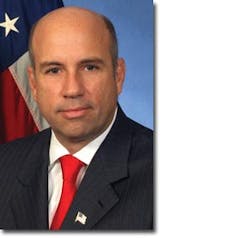Former Federal Transit Administration's James S. Simpson
Public Transportation — The Year Ahead
The coming year may well mark an important turning point for public transportation in America. I predict that in 2009, the U.S. Department of Transportation and Congress will begin laying the groundwork for many changes, both large and small, that will affect how government evaluates, funds and helps to grow the nation’s rail, bus and other transit systems.
On the whole, I believe these changes will greatly benefit the transit industry and the traveling public. Ever an optimist, I think that some of the nation’s recent challenges — the troubled economy, the gas-price crisis, the surge in transit ridership — have been a welcome shock to the system, in a way. These events have helped a lot of people, including elected officials from both parties, to realize that transit is a lynchpin of our economy. People and businesses need alternatives to the automobile and gridlock. Communities are eager to combat sprawl with compact development and transit links. And transit agencies need a predictable and adequate funding stream to build, operate and maintain their systems.
One of the catalysts for change is the new authorizing legislation for federal surface transportation programs that Congress will soon begin to tackle. While no one knows yet what the bill will contain, we can probably expect to see provisions that streamline the federal grant-making process, revise the spending ratio between highway and transit projects, cut back on earmarks that drain discretionary funds, promote new initiatives to make transportation greener and environmentally sustainable, and explore alternative revenue enhancements (such as charging drivers for vehicle miles traveled), intelligent transportation, and other efforts that move public transit forward.
New spending on national infrastructure is also likely to include funding for capital transit projects around the country. This infusion will undoubtedly help to jump-start the more than 500 transit projects now ready to go that the American Public Transportation Association has identified, but for a funding commitment from Uncle Sam to add to state and local funding. In the coming year, the funding question will loom large, and we will likely see renewed debate over how to generate revenues to supplement the current fuel taxes. I expect many ideas will be put on the table — including a potential increase in the federal 18.4 cent-per-gallon gasoline tax. Congestion pricing, which has worked well in London and elsewhere, is also likely to be part of the discussion, especially for major urban areas like New York.
These will all be steps in the right direction, but we cannot simply spend our way into a bright future. We must also insist that our leaders craft a thoughtful national transportation policy that takes a holistic, long-range view of our multimodal transportation needs and challenges. Such a policy should prioritize transportation-related investments and identify gimmick-free ways to fund these projects for decades to come. It should also align with a new national energy policy that weans us away from conventional fuels. And importantly, we need a policy that removes barriers between modes, so that we can see our way clear, for example, to building high-speed inter-city rail networks that relieve overcrowded airlines on short-haul flights in busy urban corridors.
I believe that America is rediscovering the economic value and other benefits that public transportation delivers to millions of us every day. I am confident that working together, we will find creative ways to invest, and re-invest, in a world-class public transportation infrastructure that is second to none.
Biography
James S. Simpson, FTA’s recently departed administrator, successfully steered the agency for more than two years. He approved nearly $14 billion for capital transit projects in urban and rural communities; promoted efforts to relieve congestion and spur transit-oriented development; and empowered FTA to adopt a culture of continuous improvement.
